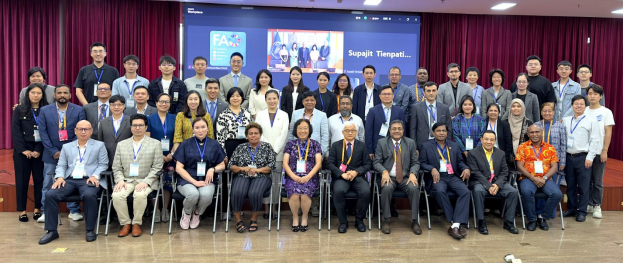FAO launches new science and innovation network to transform agrifood systems in Asia-Pacific region
Chinagate.cn, September 14, 2024 Adjust font size:

A group photo of representatives at the One Country One Product (OCOP) second regional organizing group meeting in China on Sept. 13, 2024. (Photo courtesy of Food and Agriculture Organization of the United Nations,and Institute of Geographic Sciences and Natural Resources Research)
The transformation of sustainable agrifood systems requires a more coordinated response across multiple policy levels, particularly to ensure food security and livelihoods in the Asia-Pacific region, the Food and Agriculture Organization of the United Nations (FAO) reported at the One Country One Product (OCOP) second regional organizing group meeting in China on Sept. 13, 2024.
Twenty-two countries in the region have identified 20 distinct Special Agricultural Products (SAPs) that are often neglected compared to staple crops. These products have not yet fully benefited from research and agricultural development programs. However, they are important examples of agricultural products that contribute to ensuring food security and healthy diets and have a potential to be integrated into mainstream high-value domestic, regional, and international value chains and markets.
“By bringing science and innovation to the forefront, this new network will help countries maximize the value of their unique agricultural products,” said Jong-Jin Kim, FAO assistant director-general and regional representative for Asia and the Pacific.“We are creating pathways for inclusive growth, sustainable agriculture, and improved food security by developing SAPs that are culturally significant and ecologically adaptable.”
A focus on capacity building and knowledge sharing
The network is built on strategic partnerships with leading institutions, including the Institute of Geographical Sciences and Natural Resources Research (IGSNRR-CAS) at the Chinese Academy of Sciences, the Institute of Nutrition at Mahidol University in Thailand, and other global research organizations. These collaborations will utilize advanced methodologies, such as the Geographical Indications, Environment, and Sustainability (GIES) approach, to ensure traceability of product origins, monitor environmental impacts, and enhance the nutritional value of SAP-based foods. Central to this initiative is FAO’s One Country One Product (OCOP) program, which helps member countries identify SAPs and leverage their unique potential.
FAO’s strategic partnerships will continue to drive regional development priorities, ensuring that smallholder farmers, rural communities, and underrepresented groups are included in this transformation. The initiative aims to contribute more efficient, inclusive, resilient and sustainable agrifood systems by promoting better production, enhanced processing, and improved market access.
FAO, in partnership with IGSNRR-CAS, is organizing an International Capacity Building Workshop on the GIES methodology for SAP development from Sept. 11 to 21, 2024, in Beijing. Participants will engage in field visits and hands-on training to apply these innovative practices to their own agricultural sectors. They will also showcase their SAP products at the 2024 China International Fair for Trade in Services (CIFTIS), a global event co-organized by the Chinese Ministry of Commerce and the Beijing municipal government.
This new network will contribute to the FAO Strategic Framework 2022–2031 and its goal of achieving “Four Betters”—better production, better nutrition, a better environment, and a better life for all, leaving no one behind.